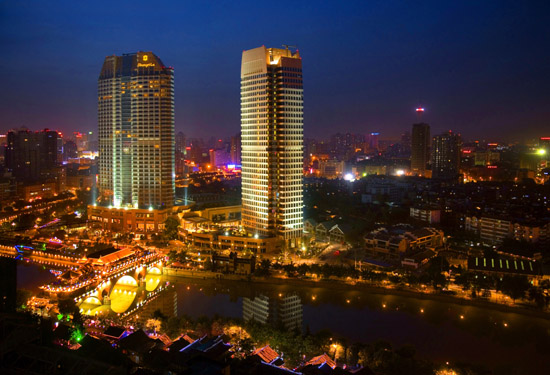
|
 |
|
Shangri-La Hotels and Resorts in Chengdu. |
Global integration
Chengdu is not a city that has suddenly materialized out of the ether. The fertile Chengdu Plain, where Chengdu lies, was the birthplace of the early Shu civilization. In 311 BC, Kaiming IX, the king of ancient Shu, established his capital city on the site, giving it the name Chengdu, which literally means "becoming the capital" in Chinese. During the Three Kingdoms period (AD 220-280), Zhuge Liang, chancellor of the Shu kingdom, called Chengdu "the land of abundance". Li Bai, a famous poet from the Tang Dynasty (618-907), exulted the city by saying "Chengdu lies above empyrean".
But the ancient capital's fast modernization and integration into the global business world did not come into fruition until the 2000s. In the year 2000 itself, the central government embarked on its "Go West" initiative, aiming to alter the comparatively backward development of China's vast western expanses.
New highways and airports were built, improvements that have paved the way for industrial expansion. Early in 2003, the semiconductor maker Intel Corp announced it would go to Chengdu to set up a factory where semiconductor chip packages would be tested. The plant started operating in 2005.
The decision was made following rounds of negotiations among Intel, Chengdu and other Chinese cities. Intel later said it was attracted to Chengdu because of the city's strategic location, good infrastructure and deep pools of talent.
Intel's coming to the city was followed by similar moves by various other IT giants, including Dell Inc, Lenovo Group Ltd, Foxconn, Compal Electronics Inc and Wistron Corp. One out of every two of the laptop microchips made in the world is now produced in the city. And two-thirds of the world's iPads come out of Foxconn's Chengdu plant.
Mao Yushi, a renowned economist in China, said a large reason why Chengdu can attract international IT giants is the relatively low cost of air freight in the city. Beyond that, the companies' products, such as microchips and tablets, tend to be light, making it easier for a city such as Chengdu to overcome its previous disadvantages in transportation.
"In the old days, big cities tended to lie along big rivers and seas, because the cost of water transportation was the lowest there," Mao said. "But today's consumer goods tend to be much lighter and expensive. So cities such as Chengdu have a big opportunity to develop."
This is reflected in traffic flow figures for the city's airport. Last year, the Chengdu airport's customs office handled 64,600 tons of goods, up 264 percent from the year before. Chengdu is also the only city in west China that has managed to get the shipping companies United Parcel Service Inc, FedEx Corp and DHL to open a direct-freight business in it.
|
 |
|
Chengdu's Dujiangyan irrigation system, built in 256 BC during the Warring States Period (475-221 BC) , is still in use. [Photo/China Daily] |
Besides shipping, many executives at international companies said the city's talent pool was a large attraction to them.
"We chose Chengdu for the cultural environment, forward-looking government and excellent labor resources, not for its labor costs," said Bian Chenggang, general manager of Intel Products (Chengdu) Co Ltd.
As an example of what he means, Bian talked about a product recall the company had to deal with early last year. On the eve of the Chinese Lunar New Year, his boss asked him to call engineers back to the company to fix the problem.
"I was under great pressure because I wasn't sure if they would be willing to leave their families on that particular day to come into work," Bian said.
To his surprise, he made 170 calls and never once received "no" as an answer. The engineers worked day and night and were able to solve the problem in nine weeks. Bian and his boss had estimated it would take three months.
"I give top marks to Chengdu's workforce," Bian said. "Chengdu is where Intel's long-term strategy lies."